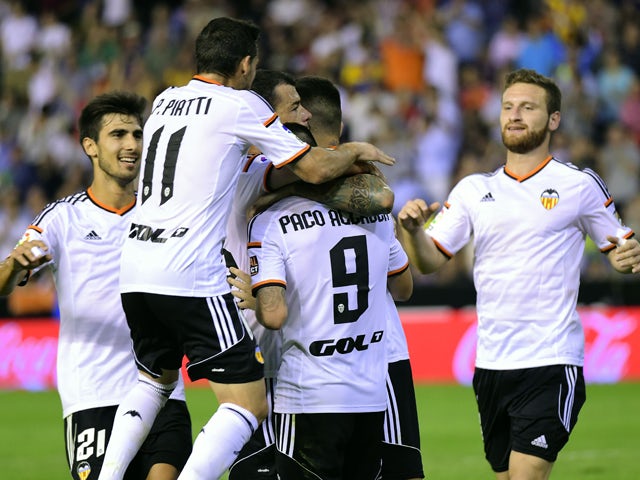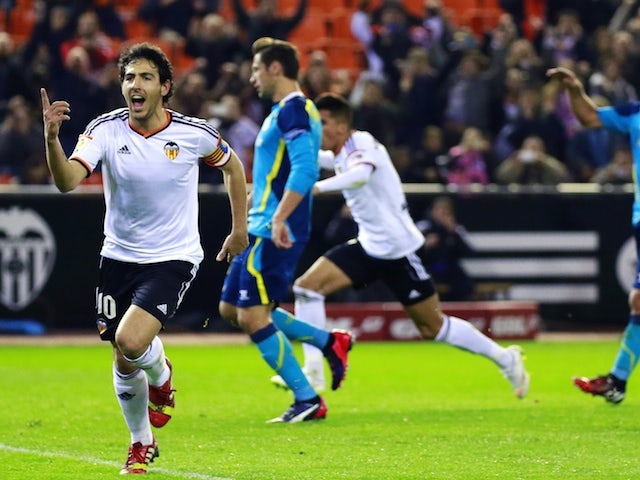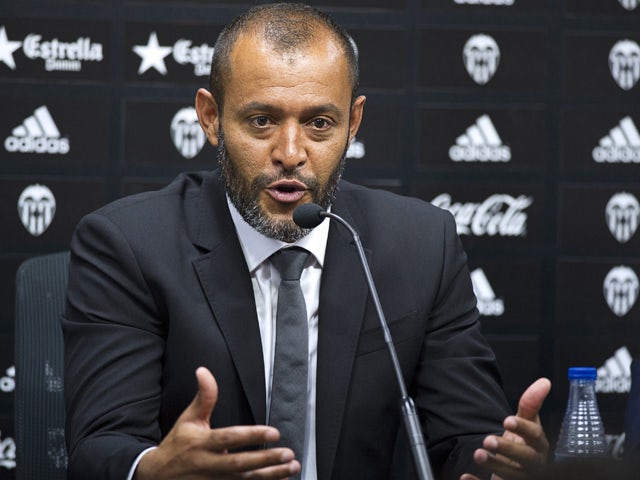With four Champions League spots available in La Liga, it's no exaggeration to say that Sunday's match between Valencia and Sevilla was a decisive chapter in the battle to qualify for Europe's title competition. The hosts entered the match in fifth, a point and a place behind their visitors.
Sevilla, however, held the advantage of having a game in hand over Valencia and two over Atletico Madrid in third. Should Sevilla win both of those games they would leapfrog Atletico and nestle behind title contenders Barcelona and Real Madrid. Valencia, conversely, were worried about what was behind them - Villarreal, in sixth, only trailing on goal difference.
Both teams went into the game with a surprisingly clean absentee list given that the season is approaching two-thirds complete. With Nicolas Otamendi fit enough to start after picking up a slight knock, only attacking left-winger Pablo Piatti was unavailable for Valencia.
Stephane Mbia, away on Africa Cup of Nations duty for Cameroon, was the only missing player for Sevilla as they welcomed the return of central defender Nicolas Pareja following suspension.
Both teams went into the game in superlative league form. Sevilla began the day as the best team in Spain based on recent La Liga results with five wins in their previous six games (one draw), including clean sheets in their last five. Their last league defeat came against Barcelona in November, with the Catalans overrunning them 5-1.
Valencia weighed in with nine wins in their previous 11 league games, the high point coming in the form of a 2-1 win over Real Madrid at the start of the year. As with Sevilla, their last league defeat came at the hands of Barcelona in November - albeit with a more respectable 1-0 scoreline.
 © Getty Images
© Getty Images
While league form for the combatants was commendable, the general consensus prior to kickoff was that this would be a cagey affair given how important the three points would be for their Champions League aspirations.
Scrappy first half, a comedy of errors
From the off it was clear that both teams were dedicated to stifling the attack of the other. With two defensive midfield stoppers deployed in each XI, preventing penetration through the middle of the pitch was the universal defensive strategy.
Given that Valencia and Sevilla boast significant creative talent in their advanced midfield positions, such a disciplined system was to be expected. As such, the first team to score would likely gain a major advantage - the players on display potentially capable of shutting a game down and ably defending a one-goal lead.
The rugged lineups were matched, predictably, by the physicality of the opening 30 minutes. We tend to think of the English Premier League as the most physical of Europe's major competitions, but the 22 men that took centre stage here seemed dedicated to proving otherwise.
Such punishing tackles and aerial battles resulted in huge disruption to the flow of the early game, with the referee having to pause the action for fouls ad nauseam. This meant that neither Valencia nor Sevilla were able to cement their will on the other, the vast majority of scoring chances coming from deep free kicks pumped straight into the box.
It was Valencia, however, that managed to establish the slightly more disciplined performance when in possession. That slender advantage in passing and movement leading to an 18th-minute penalty and the first goal as captain Dani Parejo performed the honours from the spot.
In what would become a theme of events to come, Sevilla's defenders found themselves completely incapable of tracking and managing runs in behind them. A lofted ball into the box towards Alvaro Negredo was completely missed by Diogo Figueiras (the right-back playing out of position on the left), causing the defender to clumsily bring down the Valencia striker from behind. While Negredo's fall was worthy of an Oscar, the ridiculousness of the tackle deserved the penalty that it spawned.
 © Getty Images
© Getty Images
Sevilla's defending might have been awkward, but the move itself represented the beginning of an attacking mindset that would ultimately go on to guarantee Valencia's victory. With so much congestion through central areas, Los Murcielagos adopted a campaign dedicated to exploiting space on the flanks - a strategy that came into full flow in the second half.
Intelligently, however, quick passing moves back and forth between the centre and the sidelines prevented Sevilla from being able to load up on the sideline in an effort to counteract the danger.
Lop-sided attack works wonders
This sideline-to-centre approach was most aggressively pursued on Valencia's right. Moving up regularly from full-back, the right-sided Joao Cancelo would hug the touchline while playing delicate one-two passes with the more centrally-based Rodrigo and Parejo.
This movement meant Sevilla had to cover a lot of ground in both midfield and defence, positioning themselves to cover at least two-thirds of their own half at any one time as Valencia demonstrated themselves as experts at 'making the pitch big'. The positional disciplined required of Sevilla stifled their threat whenever they attempted to launch counter-attacks - a tactic they turned to following Valencia's opening goal.
To make matters worse for Sevilla, Parejo and the left-sided Andre Gomes would frequently switch positions and cause confusion among their assigned markers. Given that so much effort was already going into cutting off passing channels on Valencia's right, the fact that Gomes and Parejo constantly popped up in different areas of the pitch meant there was never a level of comfort for Sevilla to fall back on.
Parejo in particular was adapt at drifting into the space given up on the left, his markers seemingly unaware of where he was much of the time. The midfielder made excellent use of this space for his second goal, cutting in from the left and behind the Sevilla defence while they were distracted with Valencia's continued overload on the right. What followed was a simple pass, a clear sight of goal and an unchallenged finish past keeper Beto.
This was a wonderful example of just how effective misdirection can be as a tool to create space. Valencia had spent so long conditioning Sevilla that any danger would be limited to the right/centre that the away team seemed to abandon the left side. Psychologically this must have been a devastating blow, with the goal coming from an area deemed safe and forgotten by the defenders.
Sevilla dominant for limited period
To Sevilla's credit, they reacted brilliantly to going two goals down. Abandoning their staunch counter-attacking system for the final 10 minutes of the first half, they won two - very much deserved - penalties following dangerous attacks down their own right-hand side.
This penetration was largely thanks to the work of Gerard Deulofeu, Sevilla's star performer on the night and the only player who posed a consistent threat to Valencia's back line. For this 10-minute period it was common for Deulofeu to find possession on the wing with no fewer than six players ahead of him, all looking to receive the ball inside the box.
 © Getty Images
© Getty Images
While his crosses and passes rarely found his teammates in dangerous positions, the threat and sheer numbers in attack were enough to force Valencia into reckless tackles that gave away the penalties. Only a stunning Diego Alves save from striker Carlos Bacca's second attempt from the spot prevented the visitors drawing level.
In truth, Valencia gave Sevilla every opportunity to attack. A change in mentality was obvious following their second goal as the home team looked to simply hold their lead until the half-time whistle by dropping back phenomenally deep. Even Negredo found himself playing as part of an 11-man unit camped defensively in their own half.
Negredo's deep position meant that Valencia had no outlet when they won possession and, as such, forced themselves into simply clearing the ball straight back into Sevilla's feet - usually no further back than the halfway line.
Buoyed by the lack of threat to their goal, Sevilla's full-backs were free to push very high up the pitch, leaving just the two centre-backs as cover. The knock-on effect here was that Deulofeu found himself with even more licence to commit himself wholesale to attack.
Right-back Coke's presence in more attacking areas acted to draw defenders away from Deulofeu, it also provided the midfielder an outlet for when he came up against a wall. This allowed Sevilla to spend the closing moments of the half camped in Valencia territory.
Given the number of dangerous positions Sevilla found themselves in, they will be unhappy at the lack of clear-cut chances that they created. Despite Deulofeu's tormenting presence, his centrally-located teammates failed miserably to find space.
While two penalties were earned, there remained a total lack of clear-cut scoring chances. Otamendi and Shkodran Mustafi put on a masterclass of central defensive positioning, allowing Bacca and company space in certain areas, only to completely stifle them in and around the box. This clouded Deulofeu's hard work with an aura of impotence, the player taking everything that was allowed to him but not receiving the assistance required to carve out close-range scoring chances.
While Valencia were undoubtedly overrun in the half's closing moments, they managed to retain the majority control of the pitch's most dangerous zones.
Valencia adapt and conquer
The ending of the first half and the entirety of the second couldn't have been more different for Valencia. A change of strategy saw, for the first time in the game, the home team look to keep the ball on the floor and play a possession-heavy game within Sevilla's half.
Given the success of the approach, it raises the question as to why manager Nuno Espirito Santo didn't employ the strategy from the opening minute. Part of the answer comes from Sevilla's own change in outlook, their second half dedicated to sitting deeper and increasing their focus on springing counter-attacks.
 © Getty Images
© Getty Images
Unfortunately for them, however, Valencia's precision passing in midfield (particular between Parejo, Cancelo and Rodrigo) meant that the ball was only rarely gifted. The sheer brilliance with which those three were able to craft passing triangles and retain possession meant that Sevilla expended far too much energy chasing the ball, limiting their ability to strike decisively when they had the chance.
The frustrations associated with getting the ball back also caused Sevilla to be drawn easily out of position, a problem that became more pronounced as the game went on and the visitors became more desperate to score.
This ability to draw Sevilla out of position was highlighted with devastating effect for Valencia's third goal. With keeper Beto receiving the ball at his feet in goal he found himself with no option other than to simply kick the ball down the pitch, all nearby passing options invalidated thanks to the awkward positions they found themselves in.
The ball went straight to the opposition and was swiftly played to Rodrigo on the left, a pass that drew no less than three Sevilla players towards it. This gave Javi Fuego, advancing from his deep midfield role, plenty of space at the edge of the box and time enough to calmly guide the ball past the helpless Beto.
Unsurprisingly, the two-goal deficit, combined with Valencia's clearly superior passing game, shell-shocked Sevilla and they never again looked like getting back into the game. Instead they devolved into long diagonal balls forward that made no use whatsoever of the otherwise impressive Deulofeu's abilities.
The result means that Sevilla have picked up just one point in games against the four teams that are now above them in the league. Such a statistic raises serious questions about their Champions League credentials. Their next match - the game in hand that they have over Valencia - is against leaders Real Madrid at the Santiago Bernabeu.
No Data Analysis info








